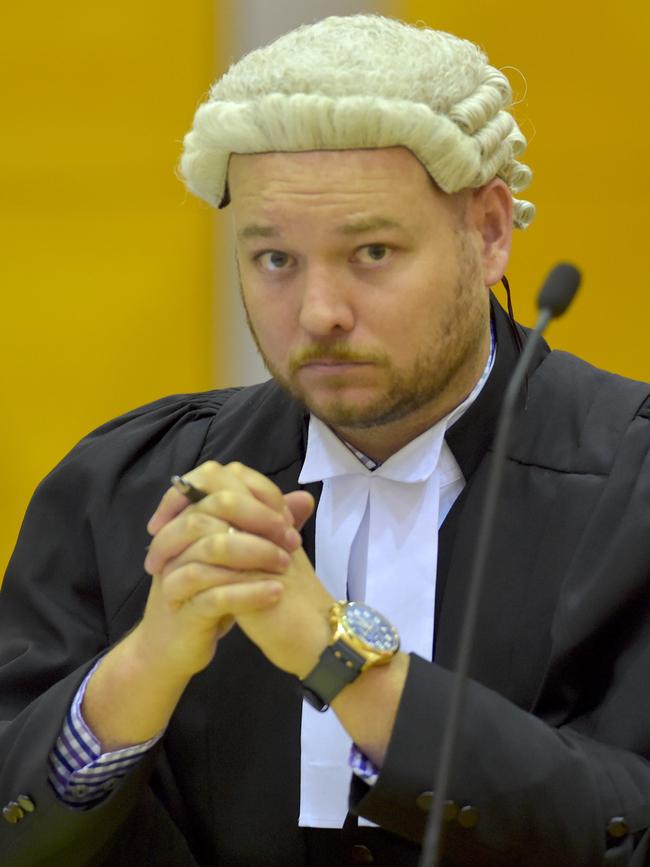Crime not an election issue
POLITICAL calls to ‘get tough on crime’ in the NT have led to some of the most devastating law reform measures ever seen, writes MARTY AUST

Opinion
Don't miss out on the headlines from Opinion. Followed categories will be added to My News.
WE cannot afford a ‘Law and Order’ or ‘Tough on Crime’ election.
We cannot afford hysteria. We cannot afford retribution. We need an honest dialogue with the community and evidence-based policy reform.
Unfortunately across at least the last 20 years, successive governments in the Northern Territory have persisted in introducing some of the most devastating law reform policy in the entirety of Australian criminal law jurisdictions.

Time and time again our general community, our business owners, our children and importantly our most vulnerable members — the homeless, the sick, the uneducated, the English as a second language speakers — have been let down through punitive and short cited policy that doesn’t address underlying criminogenic risk factors. Policy reform that doesn’t promote rehabilitation and that does not reduce recidivism in any meaningful way.
Broadly speaking, across the past 10 years crime rates in youth and adult jurisdictions have been steady or have reduced. Unfortunately we have crime and we have issues with youth offending. The issues are entrenched and often underpinned by socio economic disadvantage; including unsafe and unsettled family environments, lack of appropriate housing and education and in particular, early interventions for mental health and drug or alcohol issues. These issues cannot be resolved overnight. They cannot be resolved by a few strong words aimed at alarming an already misinformed and frightened community that wants a quick fix that is simply not possible.
MORE FROM MARTY AUST
SCARE campaign will make innocent people victims, writes Marty Aust
CLP accused of ‘fearmongering’ with proposed new youth justice policy
BAILl campaign ‘pure propaganda’, says Criminal Lawyers Association
Community involvement and consultation is crucial. Undoubtedly there are issues with property offending in Alice Springs. I have met with a number of MLAs including from Central Australia. It seems that a cohort of very young children, aged between 6 and 12 years, are causing the majority of the trouble, and that largely the trouble is occurring during day time hours. As an aside; generally speaking, children of this age group are not criminally responsible and would fall outside the scope of our criminal justice system.
We need to remember that we had a $40+ million Royal Commission into the Detention and Protection of Children in the NT. The starting point for policy reform in the youth space is to adopt and enact in legislation all 209 of the recommendations from the final report. Sensible and responsible policy reform is to acknowledge the issue is not a quick fix and that a collaborative approach between departments and investment in the sector is required. We need to engage at risk youths with services and create consequences for offending behaviour before they reach our failed adult system of ongoing mandatory sentencing and jail with no care or adequate assistance.
I am hearing from political hopefuls that victims of crime are put last. That is simply not the case. The Northern Territory criminal justice system has very strong legislative safeguards for witnesses and victims of crime.
The voices of victims are paramount in our sentencing process and a requirement in every sentencing exercise. There are specific protections afforded that do not allow for certain victims to be called at committal proceedings, there are protections that govern the manner of giving evidence, prerecording of statements and limits on cross examination.
Victims and witnesses are provided with information and referrals to counselling services and are assisted by dedicated specialist witness assistance officers. These are but a few aspects of our system that put victims’ front and centre and try to limit the impact and trauma associated with the court process. Further victims are able to access compensation payments and often restitution orders will be made.
AMAZING NT News subscription offer: Only $1 for first 28 days
We cannot afford to regress and allow the community to be misinformed and manipulated. The best policy is to be honest with the community.
We need to reintroduce community courts and specialist drug and alcohol courts. We need parole reform, to abolish all mandatory sentencing, to implement the recommendations of the Royal Commission, to create jobs and infrastructure in communities and urban centres and to tackle mental health and drug and alcohol issues as medical issues. The current Draft Aboriginal Justice Agreement can have no practical effect or impact unless the palpable current legislative barriers that exist are removed.
It doesn’t matter who forms government after the next election, as long as they are committed to these sensible evidence-based policies over a ten-year period. We need long term solutions, not rhetoric, if we truly want to see a reduction in crime rates, increases in education, employment and productivity and greater money available to the treasury to further invest in positive policy reform for the Northern Territory in the long term.
Marty Aust is the president of the Criminal Lawyers Association of the NT


